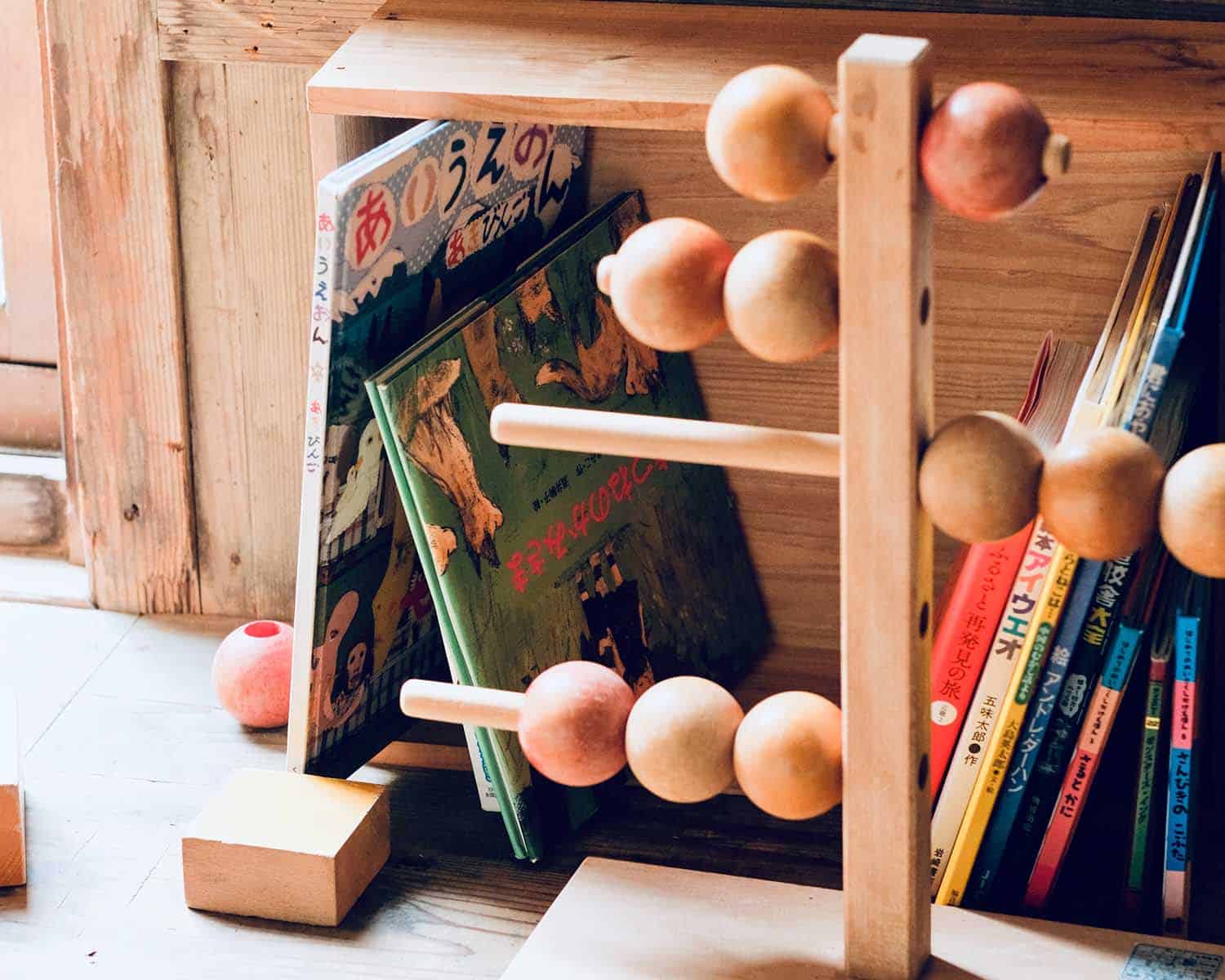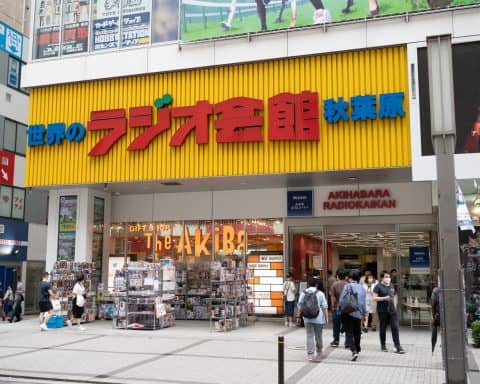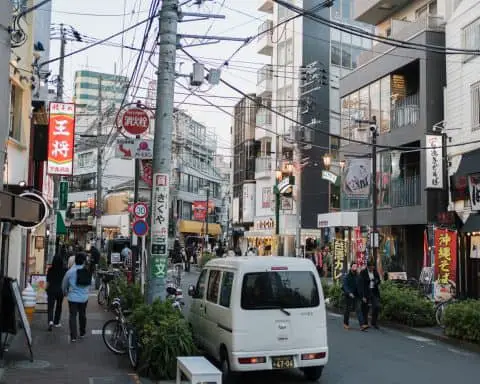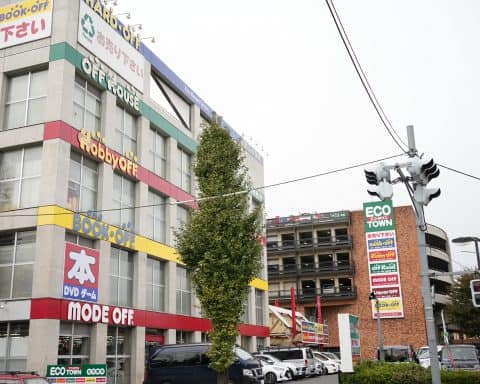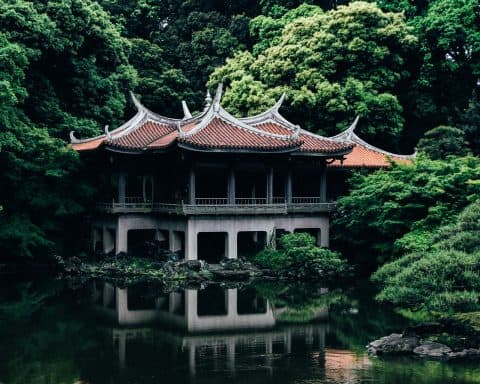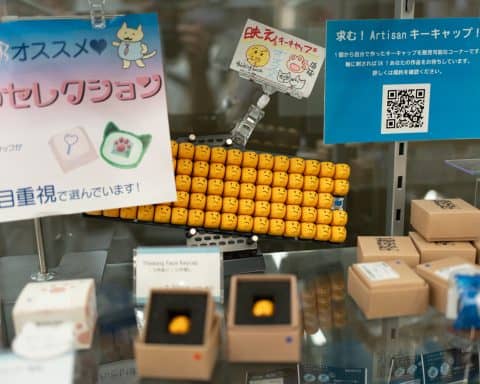For a lot of people, traveling around Japan without a care in the world is a lifelong dream. Unfortunately, there’s the small issue of the language barrier that makes things a little difficult! So, do you need to learn the language before taking a trip, or can you travel to Japan without speaking Japanese?
By sticking to the cities, grabbing an IC card, and learning the cultural etiquette, (and 7 other things!) you’ll be able to travel around the majority of Japan without Japanese, and shouldn’t stumble into any major problems.
So, here are 10 ways to survive your holiday to Japan without speaking Japanese. Number 9 is one of my favorites for sure!
1. Learn the basics

Ok, so I know this first one seems like a little bit of a cop-out, but let’s just get it out of the way because it’s always going to be helpful. Learn just a couple of the basic phrases, and things are bound to run smoother.
こんにちは – konnichiwa – Hello
これわいくらですか – kore wa ikura desu ka – How much is this?
すみません – sumimasen – Excuse me
わかりません – wakarimasen – I don’t understand
ありがとうございます – arigatou gozaimasu – Thank you (formal)
___ 和どこですか – ___ wa doko desu ka – Where is ___ ?
Best Japanese Phrasebooks For Tourists
If you’re anything like me, the thought of actually learning a language before you go on holiday seems like a big ordeal. Sure, you could just learn Katakana and feel a spark of joy every time you can read and translate a word, but how helpful is that actually going to be?
A quick and simple Japanese phrasebook might be the best option for you if, at the very least, you just want to seem like you’re trying. Here are two of my favorite phrasebooks for your first time in Japan:
I’ve talked about this book before on the site, and my love for it hasn’t diminished. Packed full of useful phrases, a dictionary, and a handy pull-out card, the Lonely Planet Japanese Phrasebook & Dictionary is worth its weight in gold.
2. The Ultimate Japanese Phrasebook: 1800 Sentences for Everyday Use
For those that want something a little more in-depth, I would highly recommend ‘The Ultimate Japanese Phrasebook” which includes 1800 phrases to use. While it’s not entirely dedicated to just travel, some people will value its approach to learning Japanese phrases due to its broader perspective.
The Benefits Of Learning Katakana For Your Holiday
If, after reading everything above you still want to study to make the absolute most out of your holiday to Japan, then let me give you a compromise. I still don’t think it’s worth it to dedicate hours of your time to study Japanese (unless you truly want to or are doing it anyway to learn the language fully) but there’s one part of the Japanese language that could be extremely helpful for you.
In case you don’t already know, Japanese has three different alphabet scripts: Hiragana, Katakana, and Kanji.
Hiragana is often the first script you’ll learn. It’s easy, includes all the sounds in Japanese, and technically gives you the ability to read everything in Japanese. You could learn the 48 characters in a couple of hours if you studied hard.
In simple terms, Kanji is like the words whereas Hiragana is the letters, sort of. For instance, the water for kanji is 水, and in hiragana it is みず. Technically they both mean the same thing, but kanji is more frequent in day-to-day life. You’d need to learn just over 2,000 kanji to have a proper fluent conversation.
Finally, we have Katakana, the alphabet I would suggest learning before you go to Japan if you want to. Katakana has 46 individual characters and is frequently used in the Japanese language.
Why do I recommend learning this alphabet? Because it’s used for English loan words.
Take a look at the table below and see just a few of the English words that are frequently used in Katakana:
| Katakana | Romaji | English |
| カメラ | kamera | Camera |
| トンネル | tonneru | Tunnel |
| ハンドル | handoru | Handle |
| コック | kokku | Cook |
| クリスマス | kurisumasu | Christmas |
| ハンバーガー | hanbāgā | Hamburger |
| アイスクリーム | aisukurīmu | Ice cream |
| ケーキ | kēki | Cake |
So, in theory, all you have to do is learn 46 individual characters and you’ll be able to recognize a hell of a lot of words during your trip. Obviously, this is far harder to do in practice even if you know the characters off by heart.
With an almost infinite amount of fonts, contexts, and sizes, it won’t be as simple as just reading it off your computer screen. So while you might not be anywhere near fluent, it’ll certainly give you a kick when you recognize a word!
2. Grab an IC Card
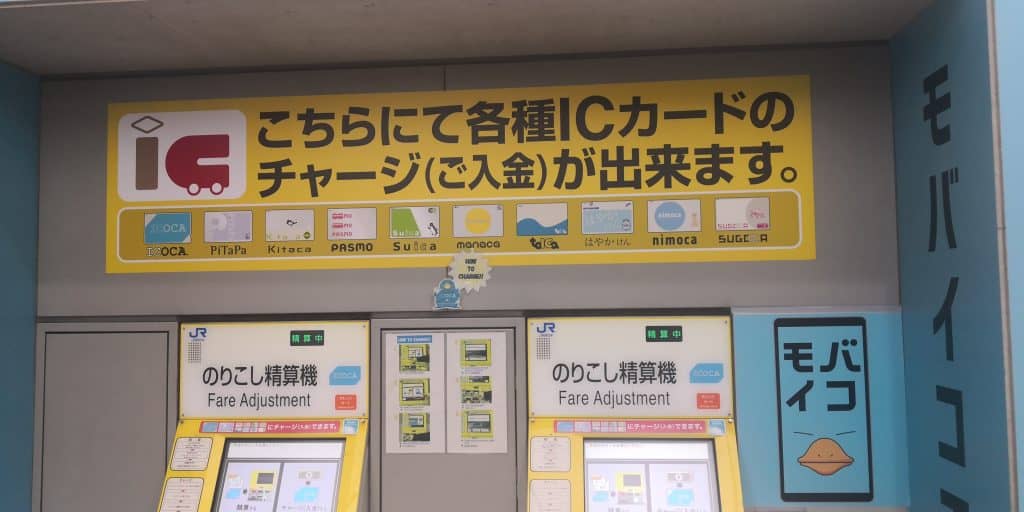
I can’t tell you the number of journeys on public transport I’ve taken in Japan without even realizing IC cards were a thing. I remember two trips I took to Japan where I decided to research the area I wanted to visit while I was at the hotel, and then use my Garmin maps on my watch to get me there.
I didn’t know which trains to get on so I was left to figure that out the old-fashioned way at the station. And for some ridiculous reason, I chose to get individual tickets EACH TIME.
Before you ask, it absolutely did make things harder and I was in countless situations where I would have to ask the station attendant to change my fare (because I ended up at the wrong station).
Other than taking far too much time and putting me in situations I didn’t want to be in (especially when I didn’t know any Japanese), it was just a hassle. Oh, and I lost them pretty frequently as well…
So, that brings me to one of the most important tips for surviving Japan without Japanese: Get an IC card.
These can come in all shapes and sizes, but if you’re arriving in Haneda or Narita with your cheap flight to Japan, the easiest cards for you to get will be either the PASMO or SUICA.
For the sake of this article, and probably your time in Japan, they’re practically identical. Get either of them, and you’ll be able to use them practically anywhere in the country.
I bought one the week I moved to Japan and the only place I’ve not been able to use it was the Hakodate line at the very top of Hokkaido. That was on my trip to Sapporo, so probably not relevant to a lot of you reading this.
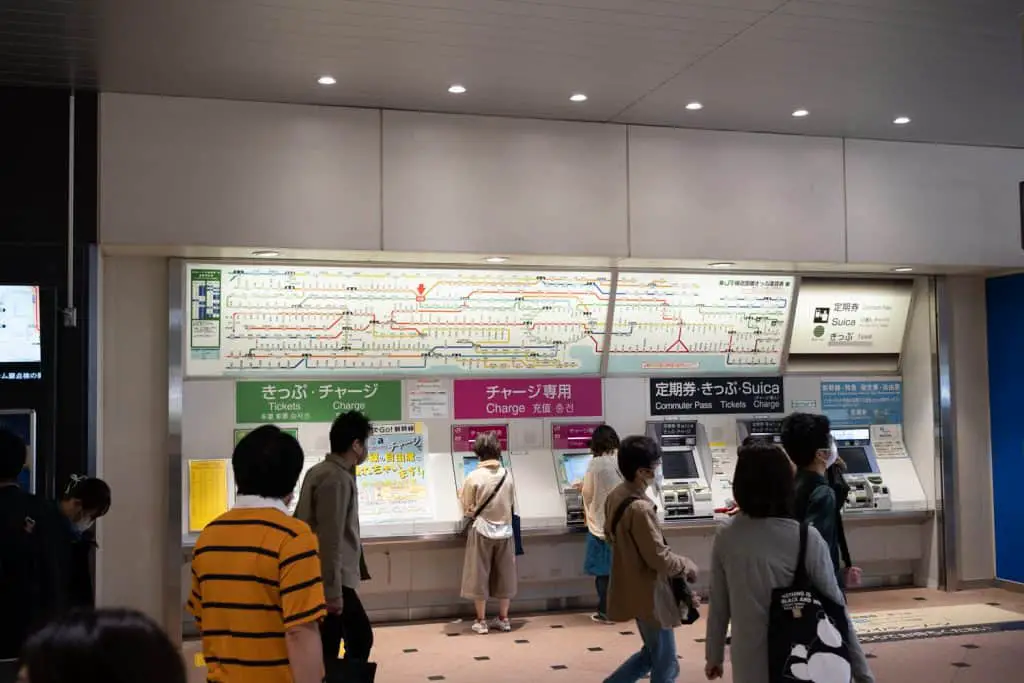
I have a SUICA card which cost me ¥500 to purchase, and now I just load money onto it any time I want to travel. It means I can be flexible with my journeys (which I often am!), and I literally never have to worry about figuring out exact stops.
Just walk up to any screen that says ‘charge’ on it, like the pink one above, follow the onscreen instructions in English, and you’ll be done in less than 30 seconds. You will need to use cash for this, though.
Oh, plus you can use your IC card to pay at vending machines, Konbini (convenience stores), and other places. A great way to survive Japan without Japanese, no need to fumble about with the money!
3. Stick to the cities
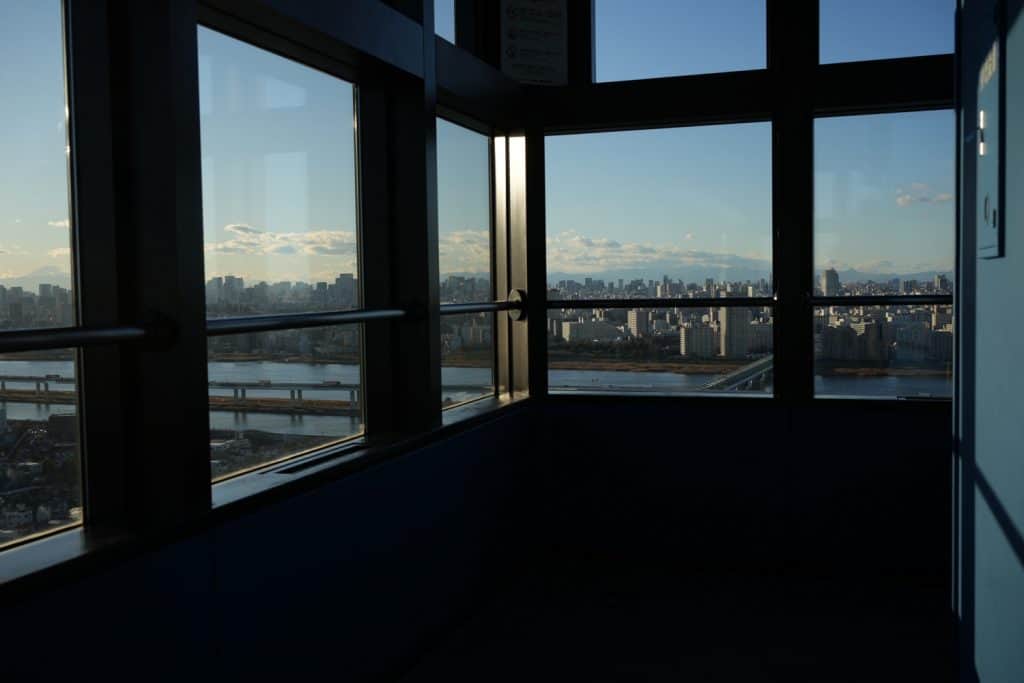
One of the best ways to survive Japan without speaking Japanese is by sticking to the main cities. I understand that this may not be an option for you if cities overwhelm you (trust me, I get you) or you had your heart set on exploring ‘off the beaten path’ areas, but sticking to the cities can make it easier to travel around Japan without speaking Japanese.
For instance, visiting Tokyo without speaking Japanese is way easier than visiting somewhere like the remote island of Iriomote. The same goes for other big cities like Osaka, Hiroshima, Kyoto, etc.
You’re going to have a much better time getting around because these places are set up for international travel and tourism. That’s especially true since they started preparing for an influx of tourists for the Olympics, and it seems to have been carried on over the last few years as well!
Do people in Tokyo speak English?
In general, the majority of people anywhere in Japan will just speak Japanese. However, in bigger cities, lots of the people working at Konbini (convenience stores) will be used to tourists, so will likely know just the right amount of English needed to help you in the store.
It’s likely that at least one person at the front desk of your hotel in Tokyo will speak English as well, though don’t be surprised if this isn’t the case. Checking into a hotel in Japan with speaking Japanese is still a very easy task, regardless of the language.
You’ll usually just be handed some forms, asked to hand your passport over for photocopying, and given your room number. Perhaps you’ll be given a few more pieces of paper that tell you about the rules during your stay as well.
In any case, you could likely do the whole thing with your eyes closed, and without speaking a word.
Oh, just be prepared for some very broken English on those forms (and rules/welcome books). It’s definitely sometimes a task to work out what certain bits mean, but it’s all part of the fun!
4. Learn the cultural etiquette
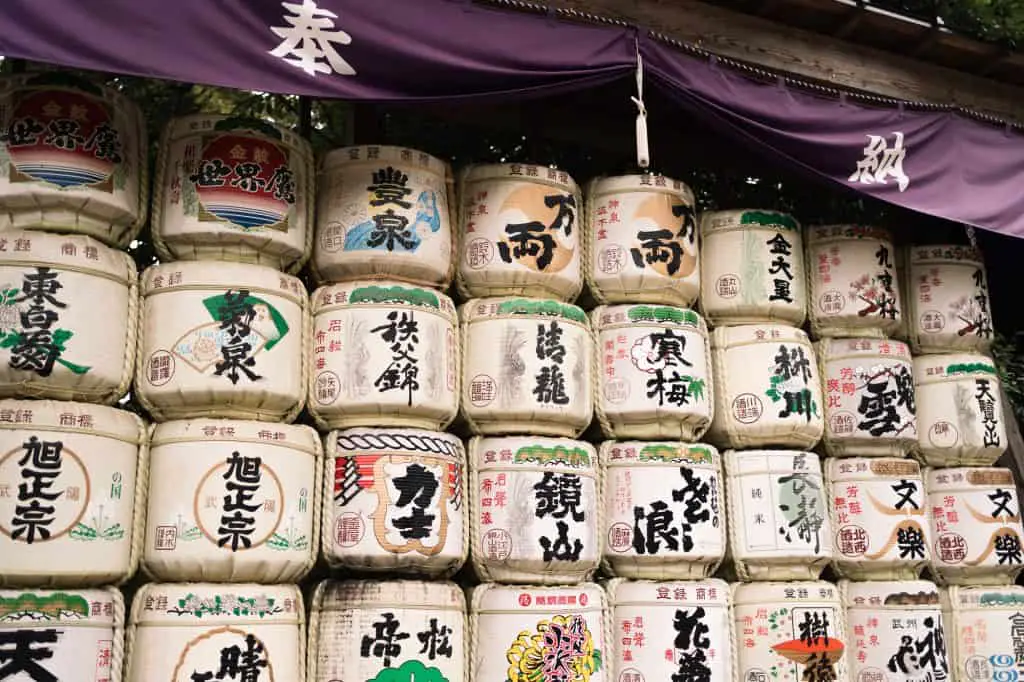
One of the best strategies to employ when you come to Japan without speaking Japanese is to be aware of some of the country’s cultural norms. This could include learning how to bow correctly, using the correct phrases for saying goodbye and hello, and taking off your shoes before entering someone’s home, or other social norms.
Here are a few examples:
Bowing your head
For instance, bowing your head slightly is a great way to show thanks. Whether a car is letting you pass, you’ve just paid for your shop, or you’re checking out of your hotel, it’s a sign of respect in Japan and it goes a long way.
Keep your voice to a minimum
I mean this mainly in terms of public transport and around quiet residential neighborhoods. Im sure that’s something you would do anyway, but respect for other people and passengers is a top priority in Japan.
Japan’s rush hour is incredibly busy as I’m sure you’re aware. I’ve been on trains through central Tokyo many times during this period and aside from being squished shoulder to shoulder with my fellow passengers, it was completely quiet.
Whether this is similar or different to trains where you live, you should do your best not to shout or cause a scene. While I’m not for one minute suggesting you shouldn’t talk, just make sure you aren’t disturbing people unnecessarily.
Don’t Jaywalk
If you’re from America, I imagine this social norm is fairly usual (maybe not, I’m not sure), but when I first visited Japan I was shocked by how many people wouldn’t cross the road until the green light was showing. When there are absolutely no cars, even if you’re on a tiny road that you could jump across, 99% of people will still wait for the lights to switch.
It was honestly pretty surreal, but if it causes fewer traffic incidents and helps keep everything moving, I’m all for it!
While neither of these things directly affect you if you can’t speak Japanese, they’re both things you can do to be respectful on your travels. You’ll almost always be given an ‘out’ because you aren’t Japanese, but I think it’s nice to try anyway 🙂
5. Use navigation apps to help you find your way around
Unless you like physical maps and asking people for directions, one of the easiest ways to visit Japan without speaking Japanese is to use one or two navigation apps. I use the two below, and I honestly couldn’t function without the latter.
Google Maps
Surprise! Bet you didn’t expect to see this one on here! 😉 One of the most useful apps for getting around in Japan is, of course, Google Maps. It easily allows you to plan routes and find places in Japan without having to understand Japanese.
With its powerful features and (relatively) accurate directions, it makes it easy for anyone to get around in Japan even if they don’t speak the language. It’s helped me make my way to more places than I can remember, but it’s important to remember it’s not always correct.
Google Maps has several features that make it especially helpful when navigating in a foreign country like Japan. The app provides detailed maps of major cities as well as rural areas so you can easily find your way around no matter where you are going.
It even offers turn-by-turn navigation with spoken instructions so you won’t have to worry about getting lost or taking wrong turns on unfamiliar roads. Plus, it includes public transport information for buses and trains so you’ll know exactly how to get from point A to B without having any knowledge of local transportation systems.
I never knew how often getting the bus in places like Kyoto would be the best choice!
Another great feature of Google Maps is its ability to search for nearby attractions and restaurants based on your current location or destination address—something that would be difficult (or impossible) if trying to do without it.
I must stress though, that google maps and opening times in Japan are notoriously unreliable. If you can, ring the place up before you go so you aren’t disappointed!
JapanTransit
This app is absolutely awesome, and I’d choose it 9/10 for navigating public transport in Japan. It offers a comprehensive database of public transportation routes and schedules throughout the country, making it easy to find your way around quickly and accurately.
Not only does it give you far more accurate routes than google maps does but it also offers you different options depending on what is most important. Each route it shows will have an ‘L’, ‘F’, or/and an ‘E’ which shows the least (cheapest), fastest, and easiest (least changes).
While it can only go from station to station, that’s enough – just use google maps for either side. My trips throughout Japan are always pretty adaptable, and having the choice between all those options at my fingertips is absolutely amazing!
You can search for train lines, bus routes, and more in any city or region and get detailed information about fares, timetables, and stops, all without having to understand Japanese. Plus, you can save all your favorite places for quick access when you need them, and the app also has a lot of extra filter options depending on what your circumstances are (different passes etc)
6. Download Jisho
If I could write a love letter to only one app, it would be this one.
Though not quite a love letter, I have talked about it before on this site in the best online Japanese resources article. Check that out if you’re interested in learning more.
Jisho is an incredibly powerful and user-friendly online dictionary that, in my opinion, really isn’t talked about enough in the Japan travel community. It’s an absolute must if you’re traveling to Japan without speaking Japanese.
Jisho allows users to look up any word they need quickly and easily while in Japan. You’ll need an internet connection, but we’ll get to that in a bit!
Unlike Google Translate which offers only literal translations that are often incorrect, Jisho provides robust definitions with more context and understanding than you’ll find from any other source. It also offers audio recordings of words so you can hear them pronounced accurately before attempting to use them yourself.
One of its best features is that it’s free! So whether you’re a student studying for tests, or a traveler trying to navigate their way around Japan (that’s us!), Jisho is an essential tool for anyone looking to learn Japanese or understand the language better. With its easy-to-use interface and comprehensive library of words and phrases, it’s no wonder I love this app soooo much!
With the confidence and knowledge it provides, you’ll be able to navigate even the most intimidating of situations. I would still download google translate for its real-time translation abilities, but keep Jisho handy in case you need to look up specific words!
7. Join a tour
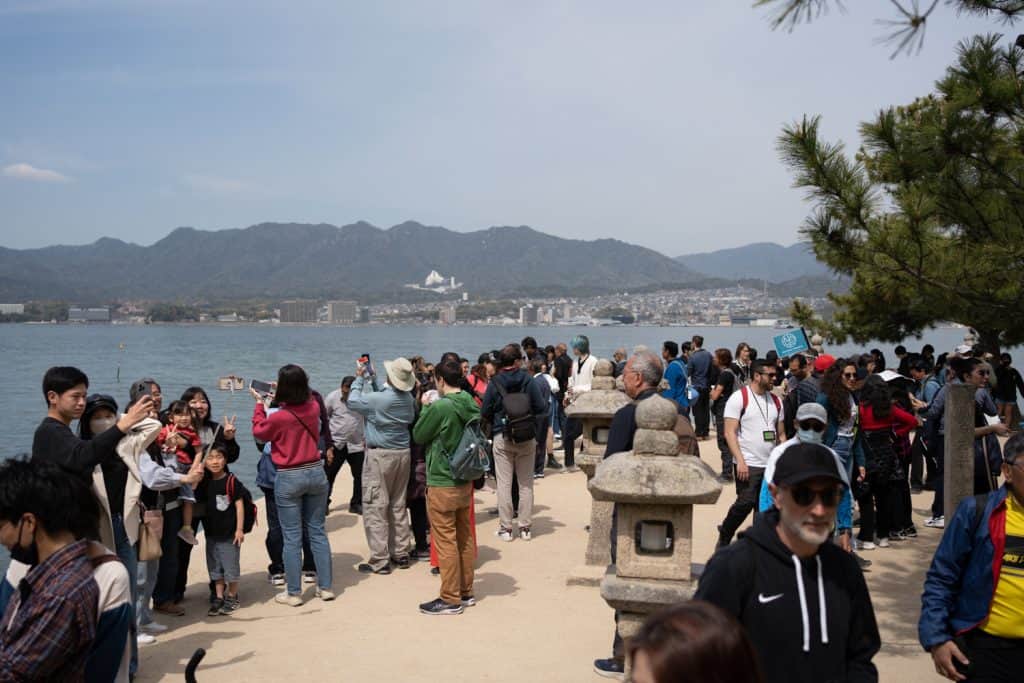
If the thought of going to a country where very few people speak English still scares you, perhaps one of the best ways to experience Japan without speaking Japanese is to join a tour. With an English-speaking guide and a group of like-minded travelers, you can explore the sights and sounds of Japan in comfort and confidence.
Tour guides are well-versed in local customs and culture, so they can provide valuable insights into the country’s history and traditions that you wouldn’t get from being on your own. Plus, having someone with you who speaks your language makes it easier to ask questions about places, people, and things along the way.
This isn’t how I would choose to explore the country (I don’t like rigid timelines!) but I can totally see why some people enjoy this way of travel. So, is there an alternative to booking your entire trip to Japan with a tour company? There is!
If you want to experience Japan with a bit more structure but don’t want to commit to a full tour, Viator could be a great option. What I like about Viator is that they work with local tour operators who often have a deep knowledge of the area and can offer unique experiences that you might not find on your own, and that really can’t be undervalued.
Another great part about booking a tour with these guys is that you can book just one tour or activity at a time, so you can mix and match it with your own itinerary and travel at your own pace. I’m all about that!
Imagine wandering through the backstreets of Kyoto with a knowledgeable guide who can point out hidden gems and tell you stories about the city’s history and culture. Or exploring the lush forests and ancient temples of Nikko with a small group of like-minded travelers.
You could do all of that without speaking a word of Japanese, which is possibly a lot more than someone who didn’t take the tour would get, at least when it comes to information.
8. Carry a hotel card or the address of your destination written in Japanese
As someone who has extensively traveled around Japan and experienced the cough *occasional* confusion that comes with navigating a new place, I highly recommend carrying a hotel card or the address of your destination written in Japanese. Just grab one off of the hotel’s front desk, or take a picture of it with your phone (unless you’ll run out of charge!).
Even with my limited knowledge of Japanese, I found that having a physical card or document with the address and contact information of my hotel or other destination was a lifesaver when I got lost or disoriented. Most hotels and hostels in Japan provide small cards with their address and contact information in both English and Japanese, which you can easily show to a taxi driver or passerby if you need directions.
If you’re staying at an Airbnb or other type of accommodation, you can ask your host to write down the address and any specific instructions (such as which train station or exit to use) in Japanese. Or to be honest they’ll probably have it on the address area of the listing on the app!
Alternatively, you can use a translation app like Google Translate to create your own card or document with the necessary information. I’d use this one as the last resort because Google isn’t too great at translating Japanese just yet.
In any case, make sure that the Japanese text is clear and easy to read, and that you keep the card or document in a safe and accessible place, such as your wallet or daypack. Trust me, having this backup plan will make your travels in Japan sooo much smoother and less stressful.
9. Look for restaurants with picture menus or food displays to help you order food.
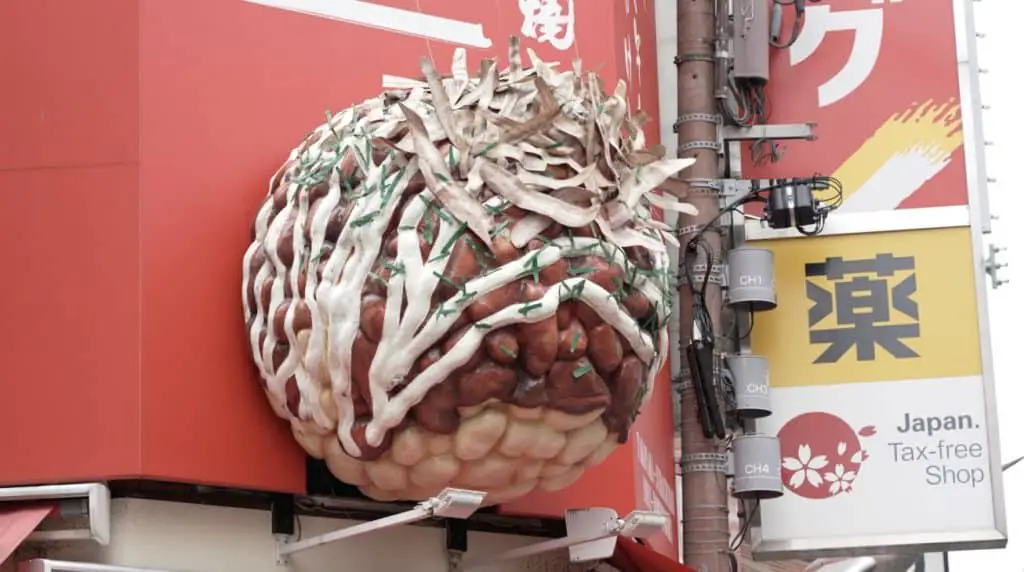
When I first arrived in Japan, I was excited to try all the delicious food that I’d heard so much about. But as soon as I sat down at a local restaurant and saw the menu, I realized there were in fact 0 subtitles in real life… I couldn’t read the characters and had no idea what to order.
Luckily, I soon discovered the wonder of picture menus and food displays, which are a common sight in Japan’s food scene. The majority of menus often feature mouthwatering photos which made ordering far more easy.
I could simply point to the dish I wanted and voila! A steaming bowl of ramen or a crispy plate of tempura would arrive at my table.
Of course, this doesn’t always work, but it’s certainly strange seeking out restaurants that have these pictures when I’ve always been told how you should actively avoid them everywhere else in the world!
Tip: Use google translate’s picture mode if you’re still struggling. You’ll be able to get at least a rough idea of what’s on offer!
Even with the help of picture menus, it can be a bit tricky to navigate the local cuisine, especially if you have specific dietary restrictions or preferences. But don’t be afraid to ask for help – the locals are usually more than happy to assist, even if it ends in a stalemate!
Fake food displays
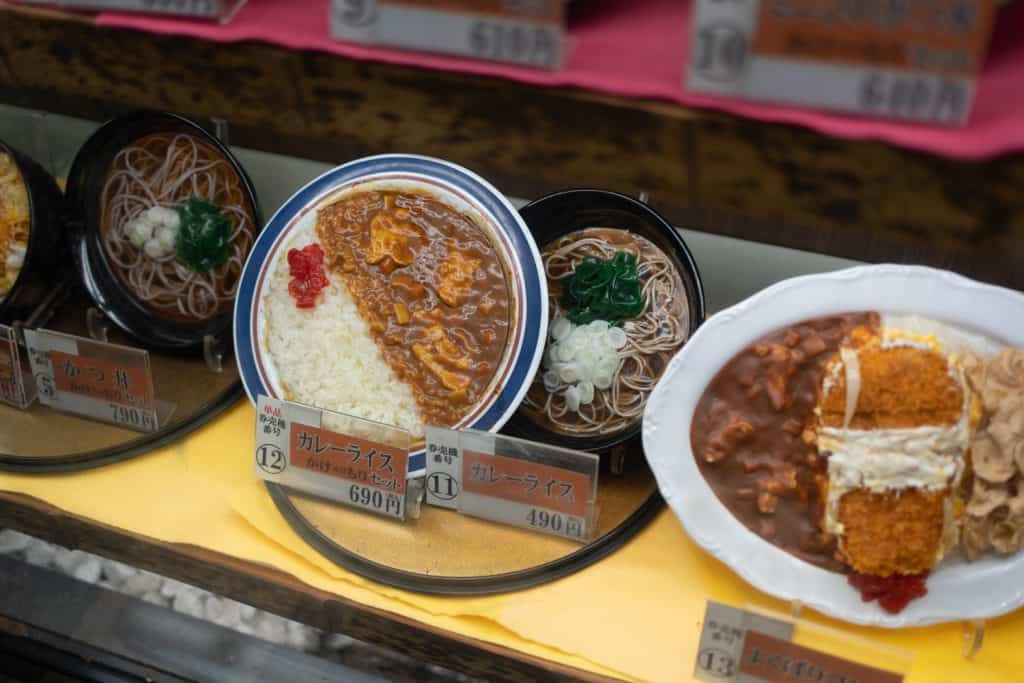
When you’re traveling to a foreign country, one of the biggest challenges can be communicating what you want to eat. But in Japan, there’s a unique solution that can help you overcome this obstacle: fake food displays.
These highly realistic and colorful replicas of dishes are a common sight outside many restaurants in Japan, especially in tourist areas. They allow customers to see what they’re ordering before they even step inside, which can be a big help for those who don’t speak Japanese or are unfamiliar with the local food.
The art of fake food displays, or “sampuru” as they’re known in Japanese, has a long history in Japan and is considered a true art form. Craftsmen painstakingly create each replica by hand, using materials like wax, silicone, and resin to capture the look and feel of the real thing. The result is often so convincing that you’ll be tempted to take a bite out of a plastic sushi roll or a bowl of ramen.
If you’re interested in learning more about the art of fake food displays, or even trying your hand at making your own, be sure to check out Gujo Hachiman. This small town in Gifu Prefecture is known as the home of fake food displays and offers workshops where you can learn how to make your own food samples. It’s a fun and unique way to experience Japan’s food culture and take home a one-of-a-kind souvenir.
10. Use gesture-based communication
Sometimes, even if you’ve mastered a few basic phrases in Japanese, communicating with the locals can still be a challenge. But don’t let a language barrier stop you from enjoying your trip to Japan – there are plenty of nonverbal ways to get your message across and body language is a big thing out here.
One of the easiest and most effective methods is to use gesture-based communication. This might include simple actions like pointing, nodding, and shaking your head to indicate yes or no. You could also use facial expressions, like a smile or a frown, to convey your emotions.
It might sound a little trivial, but all these things go a long way to helping the other person understand you and making your holiday that little bit better.
In some situations, you might need to be a bit more creative with your gestures. For example, if you’re lost and need directions, you can try miming walking or pointing to a map to indicate where you want to go. And if all else fails, you can always resort to using a translation app on your phone.
Remember, the key to successful communication is not just knowing the right words, but also being open and respectful of the local culture. By using gesture-based communication and showing a willingness to learn, you can forge meaningful connections with the locals and create unforgettable memories of your trip to Japan!
FAQs about visiting Japan without speaking Japanese
Is it worth studying Japanese for your holiday?
We’ve already talked about a few of the phrases you could use on your trip to Japan to make the most of it, but do you need to study the language in depth?
Japan is widely considered to be an extremely difficult language to learn. Whether you consider yourself a polyglot or not, the idea of learning 3 separate alphabets and a whole host of confusing grammar rules will probably make you run for the hills.
Japanese is a tough language to learn. In fact, I have over 20 books and I still don’t think I’ve touched the surface of what I’ve got to learn. With all that knowledge, how am I not fluent?!
…ok maybe I haven’t read every book on the shelf…
That’s not to say learning Japanese isn’t fun. Take it from someone who’s been learning on and off for a few years, it’s incredibly rewarding. But for a lot of people who simply want to enjoy their holiday in Japan, the benefit you’ll get from properly studying Japanese won’t be worth the amount of time you’ll have to dedicate.
For 99% of people, it doesn’t make sense to study Japanese purely for the purpose of going on holiday. You’ll have a much better time preparing for your trip properly and grabbing a survival phrase book.
Can you get by with just English in Japan?
If I’m being honest, the vast majority of people probably won’t want to learn Japanese before their trip, not even the survival phrases. It might not be the same path that I would take if I were visiting Japan for a holiday, but I understand that everyone is different.
So, can you get by in Japan with just English? The answer depends on a few different things.
The first factor that’s going to be crucial in determining whether you’ll be ok just speaking English is where you are staying. If you’re following the popular route from Tokyo-Osaka-Hiroshima (or practically any other big city), you’ll likely be absolutely fine by just speaking English.
Of course, it really will help to know a few little words like the ones above, but technically you could just speak English on your holiday and be fine. I’m not saying I recommend it (because anyone can learn a couple of words!), but it’s certainly a viable option.
As long as you’re polite, realize you may not be understood (and that’s not their fault!), and try to correctly bow when saying thank you (not as hard as you think), you’ll be fine. If all else fails, people in Japan love politeness, so a little courtesy goes a long way.
Do I Need To Know Japanese To Visit Japan?
When it really comes down to it, you don’t need to know Japanese to visit Japan, but it’ll always help if you know just a little bit. If you visit and know a few survival phrases (or at the very least know how to say please and thank you) you’re likely to get a lot more out of your time there.
Take a few moments to think about why you’re visiting Japan in the first place, and then decide on your best course of action. If you just want to see a few of the most popular sights, do some shopping, and visit the tourist attractions, you could get by without knowing anything.
If you’re thinking of wandering off the beaten track and visiting some of the smaller towns, learning a few survival phrases will be invaluable for your trip.
My Top Japan Travel Resources:
The eSIM I use to get online in Japan
The Zero-fee card I use to get money in Japan. (love these guys!)
My go-to place to compare flights to Japan
The company to choose for local tours
The place I buy all my Japan-inspired toys from… (sorry bank account!)
My favorite place to find authentic Japanese homestays
The website I use to Compare hotels in Japan without being overwhelmed!
The Ultimate Tokyo & Osaka Bucket List to help you plan your trip!



